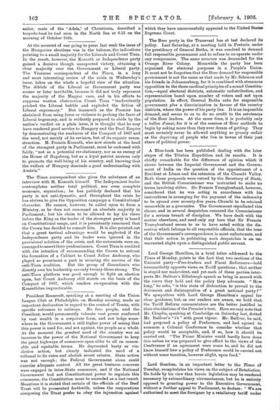The Times correspondent also gives the substance of an interview
with M. Kossuth himself. The Independent leader contemplates neither total political, nor even complete economic, separation ; be has publicly declared that his party is not anti-dynastic, and throughout the crisis he has striven to give the Opposition campaign a Constitutional character. He cannot, however, be called upon to form a Ministry, as he does not command an absolute majority in Parliament; but his claim to be allowed to lay his views before the King as the leader of the strongest party is based on Constitutional usage, and it is persistently rumoured that the Crown has decided to consult him. It is also pointed out that a great tactical advantage would be neglected if the Independence party and its leader were ignored in the provisional solution of the crisis, and the extremists were en- couraged to assert their predominance. Count Tisza is credited with the intention of recommending the Crown to entrust the formation of a Cabinet to Count Julius Andrassy, who played so prominent a part in securing the success of the anti-Tisza coalition. But the group of dissentients who directly own his leadership are only twenty-three strong. The anti-Tisza platform was good enough to fight an election upon, but Count Andrassy still stands on the basis of the Compact of 1867, which renders co-operation with the Kossntbites impracticable.










































 Previous page
Previous page